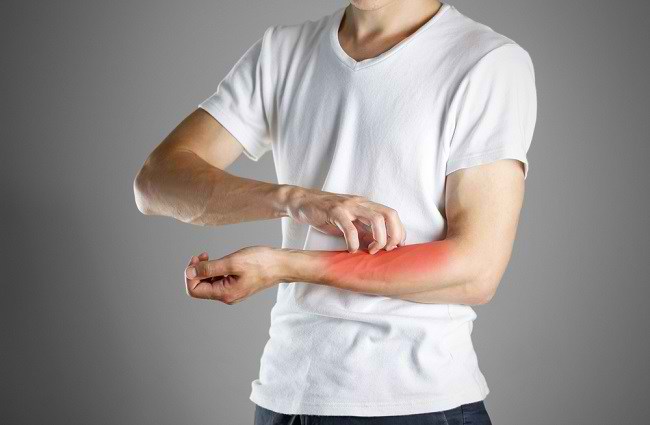Causes of Wet Eczema and Treatments That Can Be Done at Home
Wet eczema
Wet eczema is not actually a disease, but a term used by the public to describe the form of skin disorders in the form of sores or sores that look wet, runny, or even ooze pus.

Complaints of wet eczema often arise due to certain skin diseases that need to be treated by a doctor.
Skin Diseases That Cause Wet Eczema
Some diseases or skin conditions that can cause a person to experience symptoms of wet eczema include:
1. Contact dermatitis
Contact dermatitis is a disorder of the skin caused by exposure to certain substances or substances that make the skin irritated or allergic.
Irritant contact dermatitis can occur to anyone when their skin comes into contact with substances or chemicals that can damage the skin. While allergic contact dermatitis only appears in people who have allergies to certain substances or objects.
This condition can make the skin dry, itchy, and appear reddish spots and bumps that can remove fluid, blood, or pus when broken.
Apart from contact dermatitis, wet eczema can also be caused by other skin disorders, such as pompholyx and numularis dermatitis.
2. Skin infection
Each type of infection can cause different symptoms. However, in general, skin infections can be identified by the appearance of symptoms in the form of rashes, itching, pain, bumps or scabs that emit fluid, until the skin is dry and scaly.
Following are some examples of skin infections based on their causes:
- Bacterial infections, such as impetigo, abscesses, furunculosis and carbuncles.
- Viral infections, such as herpes simplex and shingles (smallpox).
- Fungal skin infections.
If it is severe, skin infection can make the skin peel, change color and feel pain, and festering. Whatever the cause, skin infections that make the skin sores and fester or bleed are conditions that need to be treated immediately.
If the skin infection is not treated properly, the germs that cause the infection can spread to other parts of the body and cause complications.
3. Ulcer
Ulcers or better known as ulcers are open sores that are difficult to heal and often recur. In severe ulcers, sometimes it can be seen muscle or even bone at the bottom.
The appearance of ulcers on the skin can be caused by infection, injury, or disruption of blood flow to the skin. Ulcers are often experienced by people who have certain medical conditions, such as diabetes, atherosclerosis, paralysis, and varicose veins.
4. Autoimmune disorders
Autoimmune disorders are conditions when the immune system that is supposed to work against germs that cause disease actually turns to attack normal body cells. Until now, the exact cause of autoimmune disorders is unknown.
This condition can not only cause wet eczema or other skin problems, but also make the body feel tired, cause fever, abdominal pain, and swelling of joints and glands.
Some examples of autoimmune diseases that can attack the skin and cause symptoms of wet eczema include pemphigus vulgaris, bullous pemphigoid, and bullerm epidermolysis.
To deal with wet eczema appropriately, the first thing to do is consult a dermatologist to determine what causes wet eczema that you are experiencing. That way, treatment of wet eczema can be adjusted according to the cause.
Various Ways to Take Care of Wet Eczema at Home
Wet eczema does have to be treated with treatment from a doctor. However, independent treatment at home also needs to be done so that the recovery of wet eczema wounds can be faster and better.
Here are some steps to treat wet eczema that you can take:
1. Avoid scratching eczema.
If you scratch, wet eczema will get worse and injury can occur. Scratched eczema is also at risk of infection, so it will be more difficult to treat.
Also pay attention to your finger nails. If your nails are long and sharp, you should cut your nails and clean them so they don't potentially hurt your skin and cause infection.
2. Clean wet eczema and surrounding skin regularly.
When exposed to eczema, the skin still needs to be cleaned regularly. The trick is to take a warm bath and use a soap made from soft so as not to cause irritation to the skin. Make sure before and after cleaning eczema, you wash your hands thoroughly.
3. Cover wounds of wet eczema on the skin
So that the skin affected by wet eczema is not getting irritated or infected, you are advised to cover it with a bandage. Change the bandage at least 1 time a day or every time it looks wet and dirty.
When changing bandages, you can apply cold compresses to wet eczema to relieve itching.
4. Wear clothes that are comfortable and absorb sweat
Excessive sweating and moist air can make eczema wet on the skin become itchy and irritated. Therefore, wear clothes that are comfortable and can absorb sweat.
5. Avoid allergen triggers
If wet eczema arises from an allergic reaction or irritation, then you need to find out what triggers it and avoid it as much as possible. This is to avoid recurrence of symptoms and prevent eczema from getting worse.
If you experience wet eczema that often recurs or does not heal, immediately consult a dermatologist. Avoid using over-the-counter drugs without first knowing what causes wet eczema you are experiencing. Using any medication risks aggravating eczema and making it more difficult to treat eczema.
Label : Health
Comments
Post a Comment